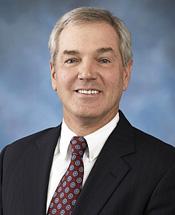Broadcasters Fight SHVERA Modifications
The debate about which broadcast signals satellite operators can carry into each designated market area continued this week on Capitol Hill. Broadcasters want to keep a lid on signal importation from outside markets to protect incumbent stations. Satellite operators can import distant signals to households that have no local, over-the-air reception, but they want more flexibility for several reasons, including leverage in retransmission negotiations with broadcasters.
This distant signal issue has been at the heart of each renewal of the Satellite Home Viewer Extension and Reauthorization Act--SHERVA--due again this year.

Paul Karpowicz “If a cable or satellite system serving one community is permitted to import the same programming from distant, out-of-market stations, the viewing audience of the local station will be fragmented--advertising rates will plummet--and the ability of local television stations to provide costly local news, weather, emergency information, and local public affairs programming will, plainly, be diminished,” Paul Karpowicz told the Senate Commerce communications subcommittee during a hearing on Wednesday.
Karpowicz (pictured right) is chairman of the TV board of the National Association of Broadcasters and president of Meredith Broadcasting’s 11-station group. He urged the subcommittee to reject market-modification proposals that would allow DirecTV and Dish Network from importing duplicate, distant signals. He said the DBS operators were already allowed to negotiate with stations directly for carriage of local news and public affairs programming with no change to SHERVA law. Cable operators do so, but DBS operators so far have not, he said.
“Our station in Atlanta has signed an agreement with a cable operator in northwest Georgia to allow it to carry non-duplicating, locally originated programming to Georgia residents in the Chattanooga, Tennessee, market,” Karpowicz testified. “Similar in-state carriage arrangements with local television stations exist across the country. Regrettably, satellite carriers have refused to participate in these carriage arrangements.”
The wholesale importation of distant signals would interfere with contractual agreements between stations and networks, he said.
For satellite operators, adhering entirely to broadcast market boundaries is somewhat complicated. The service is typically distributed via East and West Coast feeds. Current law directs DBS to “carry one, carry all” broadcast signals in a given market, but lawmakers have pushed the industry to carry “local-into-local” signals in all 210 DMAs. Neither DBS operator has completed the task. DirecTV provides local stations in 152 markets; Dish, 182.
The broadcast lobby supports the completion of local-into-local in all markets, but DBS executives say its cost prohibitive. Dish Executive Vice President and General Counsel Stanton Dodge told the subcommittee that the DBS had 29 markets remaining, and it would cost around $35 million to build the infrastructure for delivering local TV signals. Recurring costs would be around $15 million a year.
“Our ability to recoup this substantial investment is constrained by the small size of many of the remaining markets. For instance, there are fewer than four thousand households in the Glendive, Mont. designated market area. This provides very few potential households to subscribe to our service to help defray those costs, yet the costs to provide a local-into-local service are largely fixed,” he said in prepared testimony.
“Launching 29 additional markets would require us to find or create capacity for approximately 100 additional channels on a system that is effectively at, or near, full capacity today.”
Dodge went on to note that in 26 of those 29 markets, at least one of the big four broadcast network affiliates--ABC, NBC, CBS and Fox--is unavailable as a primary fee. He urged lawmakers to allow DBS operators to serve these “short markets” with imported signals.
Karpowicz countered that secondary broadcast digital feeds should instead be carried.
Get the TV Tech Newsletter
The professional video industry's #1 source for news, trends and product and tech information. Sign up below.
